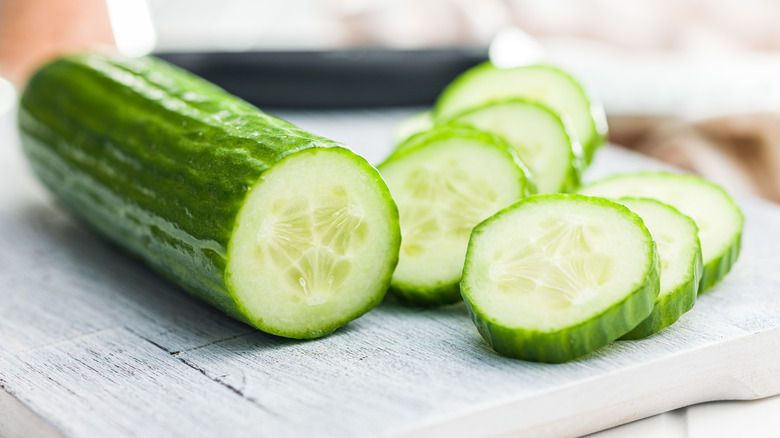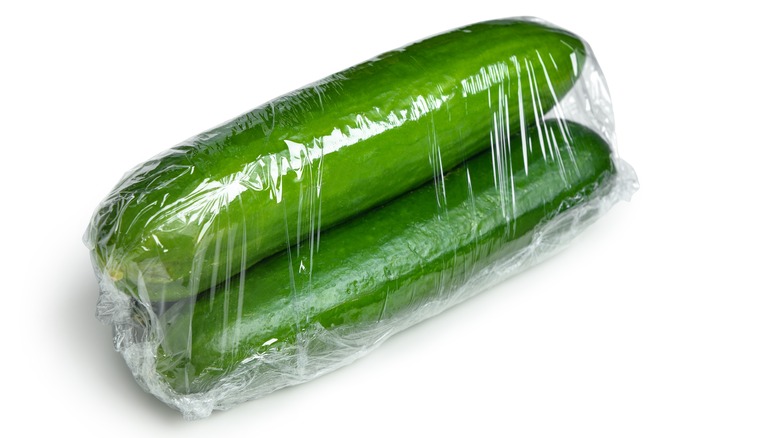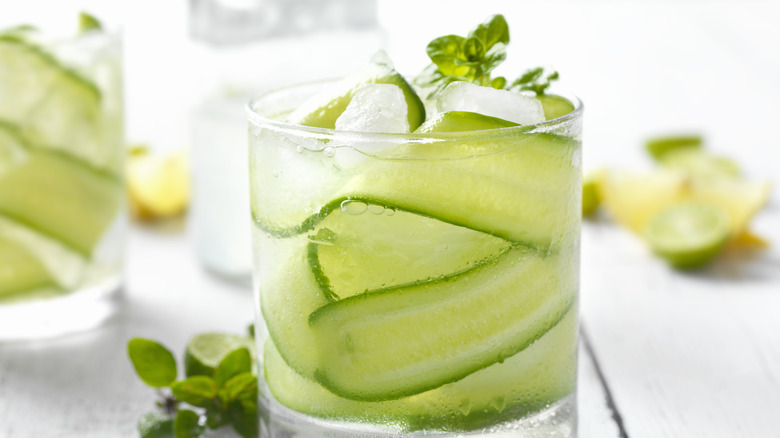The Best Way To Store Cut Cucumbers In The Fridge
What's worse than a moldy cucumber? There's so much conflicting advice about how to store one, making it hard to prevent spoilage in the first place. This fruit (which commonly gets mistaken for a vegetable) holds up fairly well when whole, but once cut, it can quickly dry out and go limp. While some sources recommend that you stow cut cukes in a resealable bag with some paper towels, others recommend submerging them in cold water. These are both decent methods, but no trick might be as convenient and efficient as tightly wrapping your cucumbers in plastic wrap.
Cucumbers are mostly water, and once cut, they need to remain hydrated so that their flesh doesn't turn leathery. Using plastic wrap to cover the entire fruit creates a thin, impenetrable barrier that locks its moisture in, preventing the chilly fridge air from drying it out. This hack helps a cucumber last for up to 10 days, and takes up the least amount of space in your fridge (especially in comparison to the water submersion method, which requires a container or jar).
The exception to this rule are cucumber slices, which should instead be transferred into a sealable bin or jar with a paper towel inside. You should try to consume these as fast as you can, as these have an even shorter lifespan than a cuke that's simply been cut in half.
Keep your cucumbers dry and away from ethylene-producing items
Before you cut and then wrap a cucumber, give it a quick rinse and dry it off. These fruits sometimes harbor dirt particles or a wax coating that will easily come off with water. It's important to pat the exterior down with a kitchen or paper towel, in order to wick off excess surface moisture. If water gets trapped inside the cling film, mold can start to grow prematurely.
Where you place your cuke in fridge can also make a big difference in how long it lasts. In particular, you never want to store cucumbers near other produce that emit large amounts of ethylene, a natural gas that hastens the ripening (and spoilage) process. Lots of fruits and veggies continue to release ethylene even after they're picked. Cucumbers are extremely sensitive to this hormone, and can wilt and mush up in a matter of days if stored alongside fruits like avocados, bananas, and melons. Letting all your produce sit together is a common food storage mistake, so place your tightly-wrapped cukes in a crisper drawer with no ethylene producers inside.
Think twice before freezing your cucumbers
While many foods can be stored indefinitely in the freezer (though they'll suffer a drop in quality), don't even try to attempt cold storage with cucumbers. Freezing will rupture their water-heavy, delicate flesh, leaving you with a droopy, squishy end result once thawed. Frozen cukes can be a viable ingredient when blended into juices, smoothies, or cucumber yogurt soup, but their use is very limited overall.
A better way to use up cucumbers before they go bad is to try some non-traditional recipes. Noodle dishes, sandwiches, and stir-fries are go-to uses for this light, refreshing fruit, but if you're in need of more inspiration, a cucumber dill gazpacho is an impressive starter for a three-course meal. In addition to cold-pressed juices and green smoothies, cucumbers actually make a great addition to alcoholic drinks, such as in a mezcal- and sherry-based refresher or an Eastside cocktail. Or, just perch a slice on the rim of your favorite light beverages for a crunchy garnish. Get creative with your meals, and you won't have to freeze your cucumbers as an unsatisfying last resort.



